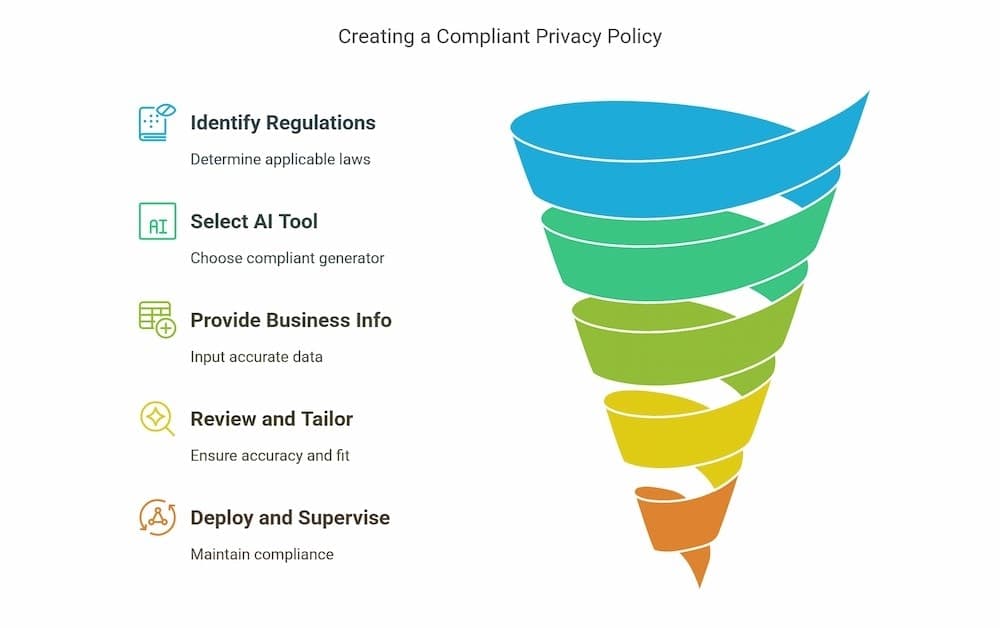Introduction
Businesses face the critical task of safeguarding user privacy while navigating an increasingly complex web of legal requirements. As the demand for transparent and compliant data practices grows, companies are turning to innovative solutions to streamline the creation of comprehensive privacy policies.
Enter the world of artificial intelligence (AI) — a powerful tool that is revolutionizing the way businesses approach privacy policy generation. AI-powered privacy policy generators are transforming the once demanding and time-consuming process into a seamless and efficient experience.
By leveraging the capabilities of AI, businesses can now create privacy policies that not only align with their specific data practices but also enhance data privacy and ensure compliance with stringent regulations such as the General Data Protection Regulation (GDPR) and the California Consumer Privacy Act (CCPA).
Understanding Data Privacy
Data privacy refers to the protection of personal information from unauthorized access, use, or disclosure. With the rapid advancement of AI technologies, data privacy has become a major concern for individuals, organizations, and governments worldwide. The General Data Protection Regulation (GDPR) and other data privacy regulations have been implemented to safeguard personal information and prevent data breaches. However, the increasing use of AI systems has created new challenges for data privacy, including the potential for AI algorithms to infer sensitive information about individuals, even if they have not explicitly provided it. To address these challenges, it is essential to develop and implement AI systems that prioritize data privacy and security, using techniques such as data minimization, encryption, and access controls to protect sensitive information.
What is an AI Privacy Policy Generator?
An AI privacy policy generator is a sophisticated tool that harnesses the power of artificial intelligence to automate the creation of privacy policies. These generators employ advanced algorithms to analyze a company’s specific data practices, ensuring that the resulting policy accurately reflects their unique business operations.
The primary objective of an AI privacy policy generator is to streamline the process of crafting a comprehensive and legally compliant privacy policy. By leveraging AI technologies, these tools can quickly identify relevant legal requirements, such as those outlined in the GDPR or CCPA, and incorporate them seamlessly into the generated policy.
One of the key advantages of using an AI privacy policy generator is its ability to ensure accuracy and consistency. These tools are designed to minimize human error and provide a standardized approach to policy creation. By inputting relevant information about their data collection, usage, and sharing practices, businesses can rely on the AI generator to produce a policy that is both thorough and compliant.
Moreover, AI privacy policy generators offer a level of efficiency that traditional manual methods simply cannot match. Rather than spending countless hours researching legal requirements and drafting a policy from scratch, businesses can leverage the power of AI to generate a comprehensive document in a matter of minutes.
This efficiency is particularly valuable for companies operating in multiple jurisdictions, as AI generators can easily adapt to different legal frameworks and create policies tailored to specific regions. For example, a tool like Pandectes can help Shopify store owners and e-commerce businesses navigate the complexities of global privacy regulations while maintaining a user-friendly experience for their customers.
However, it is important to note that while AI privacy policy generators offer numerous benefits, they are not a complete replacement for human oversight. Businesses must still carefully review the generated policy to ensure that it accurately reflects their specific data practices and addresses any unique aspects of their operations.
Additionally, as privacy laws and regulations continue to evolve, it is crucial for businesses to regularly update their policies to remain compliant. AI privacy policy generators can help streamline this process by providing ongoing updates and alerts when changes to legal requirements occur.
In conclusion, AI privacy policy generators are a powerful tool for businesses seeking to create comprehensive and legally compliant privacy policies. By leveraging the efficiency and accuracy of AI technologies, companies can streamline the policy creation process, ensure alignment with relevant legal requirements, and build trust with their customers through transparent data practices.

How to Create a Privacy Policy Using AI
Employing AI for privacy policy creation requires a strategic understanding of both technology and specific compliance mandates. The Information Commissioner’s Office contextualizes the interplay between AI and big data, highlighting how AI can unlock the value within big data while addressing privacy concerns. AI tools simplify the drafting process, ensuring both precision and alignment with legal imperatives. This section delineates a comprehensive guide to effectively utilizing AI in the development of your privacy policy.
Step 1: Clarify Regulatory Obligations
Fundamental to any privacy policy is its adherence to appropriate data protection regulations. Businesses need to comprehend the legal standards pertinent to their operations, like the GDPR and CCPA, which mandate the necessary disclosures and user rights within a privacy policy. Additionally, the importance of legal protections cannot be overstated, especially as data privacy laws evolve to address the integration of AI technologies. Strengthening and standardizing these protections is crucial for comprehensive privacy regulations and international cooperation.
- Identify Relevant Regulations: Ascertain which data protection laws pertain to your business, influenced by your operational geography and the regions you serve. This step is vital for crafting a policy that aligns with all requisite legal frameworks.
- Integrate Legal Requirements: Leverage AI tools that embed these legal standards into their privacy policy templates. This integration guarantees that the generated policy encompasses all essential elements dictated by the relevant laws.
Step 2: Selecting an AI Privacy Policy Generator
Choosing the optimal AI privacy policy generator is crucial for producing a compliant and effective policy. Ensure the selected tool aligns with the specific needs and legal responsibilities of your business.
- Assess Functionalities: Seek a generator offering customization options to accurately depict your data processing activities. This adaptability allows you to tailor the policy to your distinct operations.
- Opt for Dynamic Updates: Choose tools that offer regular updates to maintain compliance with evolving legal standards. This feature ensures that your privacy policy remains current and legally robust.
Step 3: Providing Accurate Business Information
Precisely inputting business-specific data is critical for generating a policy that truly reflects your operations. The AI tool relies on this information to craft a document that aligns with your practices.
- Detailed Data Operations: Furnish comprehensive details regarding your data collection, utilization, and sharing practices. This input ensures that the generated policy faithfully represents your business activities.
- Ensure Holistic Representation: The input should encompass all necessary components to establish a privacy policy page that is both comprehensive and compliant.
Step 4: Reviewing and Tailoring the Generated Draft
Upon receiving the AI-generated draft, it is essential to conduct a meticulous review to confirm its accuracy and thoroughness. It is also important to address privacy concerns in the final policy to ensure ethical AI practices and protect individual privacy rights.
- Execute a Detailed Examination: Scrutinize the AI-generated policy to guarantee it aligns with your specific data practices and legal duties. This step is crucial for uncovering any discrepancies or omissions in the document.
- Tailor to Fit: Make requisite modifications to align the policy with your business model. Address any unique facets of your operations that may not have been sufficiently covered by the AI-generated draft.
Step 5: Deploying and Supervising the Privacy Policy
After finalizing the policy, proceed to deploy and supervise it to ensure continuous compliance with legal standards.
- Ensure Accessibility: Publish the privacy policy in an easily accessible location on your website. This transparency fosters trust with your audience and underscores your commitment to data protection.
- Regular Revisions: Update the policy as data practices or legal requirements change. This proactive strategy ensures that your privacy policy remains compliant and reflective of your current operations.
By adhering to these structured steps, businesses can harness AI to develop effective privacy policies that not only meet legal requirements but also reinforce consumer trust through transparency and accountability.

Data Protection Principles
The protection of personal information is based on several key principles, including data minimization, purpose limitation, and accuracy. AI systems must be designed and developed in accordance with these principles to ensure that personal information is protected from unauthorized access, use, or disclosure. Additionally, AI systems must be transparent, explainable, and fair, ensuring that individuals are informed about how their personal information is being used and that they have control over their data. The EU AI Act and other regulatory frameworks have been established to promote the development and use of AI systems that prioritize data protection and privacy, and to mitigate the risks associated with AI and data privacy.
AI-Enhanced Data Governance
AI-enhanced data governance refers to the use of AI systems to improve data management and protection. AI algorithms can be used to classify and categorize data, identify potential security risks, and detect anomalies in data processing. Additionally, AI systems can be used to automate data protection processes, such as data backup and recovery, and to provide real-time monitoring and alerts in the event of a data breach. By leveraging AI and machine learning algorithms, organizations can enhance their data governance capabilities, reducing the risk of data breaches and improving their overall data security posture. Furthermore, AI-enhanced data governance can help organizations ensure compliance with data privacy regulations, such as the GDPR, and demonstrate their commitment to protecting personal information.
The Role of AI Algorithms in Data Analysis
AI algorithms play a crucial role in data analysis, enabling organizations to extract insights and patterns from vast amounts of data. However, the use of AI algorithms in data analysis also raises concerns about data privacy and security. AI algorithms can be used to infer sensitive information about individuals, even if they have not explicitly provided it, and can potentially perpetuate biases and discrimination. To address these concerns, it is essential to develop and implement AI algorithms that prioritize data privacy and security, using techniques such as differential privacy and federated learning to protect sensitive information. Additionally, organizations must ensure that their AI algorithms are transparent, explainable, and fair, providing individuals with control over their data and ensuring that they are informed about how their personal information is being used. By prioritizing data privacy and security in AI algorithm development, organizations can mitigate the risks associated with AI and data privacy and ensure that their AI systems are aligned with regulatory requirements and ethical standards.
Is an AI-generated privacy policy legally compliant and free of privacy risks?
The compliance of an AI-generated privacy policy is contingent upon the integrity of the AI tool and the comprehensiveness of the business data provided. Ethical AI usage is crucial in ensuring that these AI-generated policies adhere to legal standards and protect personal information. A competent AI solution should integrate the latest legal stipulations, ensuring the policy is comprehensive and aligns with ongoing regulatory changes. Businesses should meticulously input detailed information about their data handling practices to ensure the policy accurately represents their operational realities.
Ensuring the AI tool remains updated with current legal developments is crucial for sustaining compliance. As regulations evolve, the tool must incorporate these changes effectively to reflect the most current legal landscape. Businesses should opt for AI solutions that offer real-time updates, bolstering the policy’s reliability and legal soundness.
Additionally, while AI tools provide a robust framework for policy development, expert legal review is indispensable. Engaging legal professionals to scrutinize the AI-generated draft ensures the policy’s alignment with both regulatory requirements and the business’s ethical standards, capturing any nuances that the tool might overlook.
By harnessing the power of AI, you can streamline the creation of privacy policies that are both comprehensive and legally compliant. As the digital landscape continues to evolve, it is crucial for businesses to stay ahead of the curve and prioritize data protection.
Conclusion
In summary, the integration of AI into the privacy policy creation process represents a significant advancement for businesses striving to protect user data while ensuring compliance with evolving legal standards. By utilizing AI privacy policy generators, companies can efficiently develop tailored policies that accurately reflect their unique data practices and adhere to regulations like the GDPR and CCPA. This not only saves valuable time and resources but also minimizes the risk of human error, fostering a more secure and trustworthy environment for customers.
However, it remains essential for businesses to maintain human oversight and regularly update their policies in line with regulatory changes. As technology continues to progress, embracing AI’s capabilities will be crucial for organizations looking to enhance their data privacy practices and build lasting customer trust in an increasingly digital landscape. If you’re looking for a trusted partner to help navigate the complexities of privacy compliance, we invite you to explore our cookie consent solution and start your free trial today.



